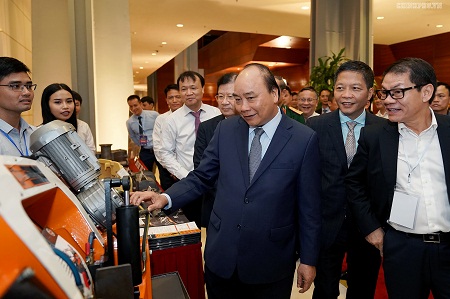Development of mechanical industry requires more incentives
The Government chief made the statement while addressing a conference on solutions for promoting the development of the sector in Ha Noi on Tuesday.
Though mechanical industry is the “backbone” of the economy, it is lagging far behind the world, requiring great efforts from the Government and businesses to keep up with fast-changing technological revolution.
It is estimated that total demand for mechanical products for 2019-2030 would reach US$310 billion but the sector may only meet some 32%, which means heavy dependence on foreign countries.

Prime Minister Nguyen Xuan Phuc visits a booth showcasing made-in-Viet Nam mechanical products on the sidelines of the conference on solutions for promoting the development of the mechanical industry in Ha Noi on September 24, 2019. Photo: VGP
Statistics show that Viet Nam has to spent billions of dollar on importing equipment, machinery and material for production annually.
Against that backdrop, Phuc stressed the Government will issue strong and synchronous mechanisms and policies, especially those on localization rates.
The Government will also mull over new bidding regulations in order to increase the proportion of local materials used in investment projects in accordance with the current laws and international practices, he said.
Viet Nam needs to further encourage foreign investment capital from reputed mechanical companies in a bid to gradually formulate domestic supply chain and expand export markets for mechanical products.
He tasked the Ministry of Planning and Investment to promptly put forwards preferential policies to lure foreign direct investment in the mechanical industry.
The Ministry of Finance was asked to propose amendments to the current tax policies to help local automobile producers increase the localization rates and these policies should be applicable within 5-10 years.
Phuc also required the Ministry to submit policies on excise tax for electric and environmentally-friendly cars.
Meanwhile, the Ministry of Science and Technology was assigned to develop a system of technical norm and criteria to protect domestic production and consumers.
According to the Ministry of Industry and Trade, the number of mechanical enterprises soared rapidly, from 10,000 in 2010 to 21,000 in 2016, accounting for 28% of total processing enterprises.
Export turnover of mechanical products reached more than US$16 billion in 2016, mainly home appliances and spare parts for cars and motorcycles.
Currently, Viet Nam’s mechanical industry is concentrated in three sub-sectors, including motorcycles and motorcycle spare parts; home appliances and tools; automobiles and auto parts.
Reports presented at the conference show that these three sub-sectors account for nearly 70% of the country's total mechanical engineering output.



